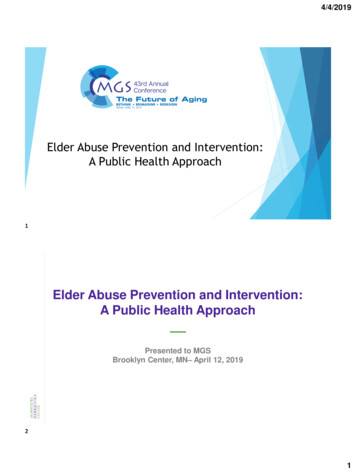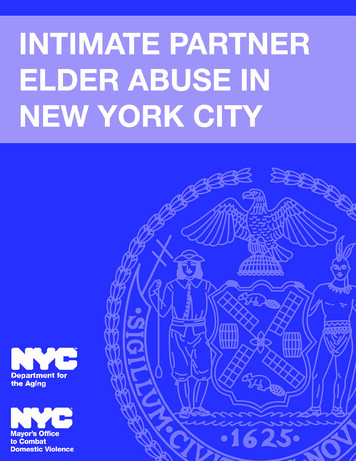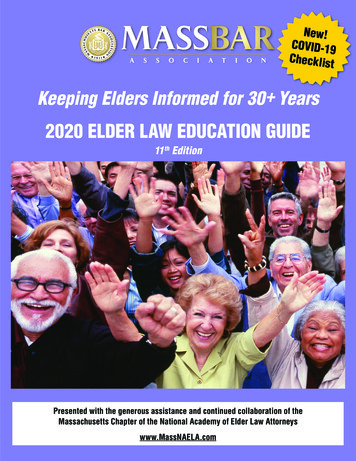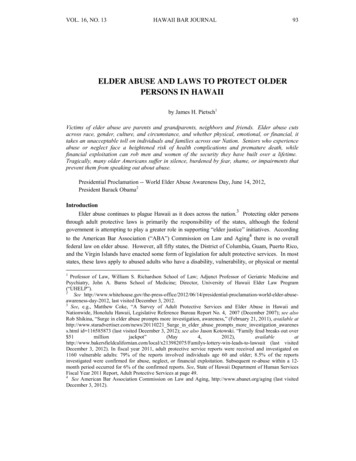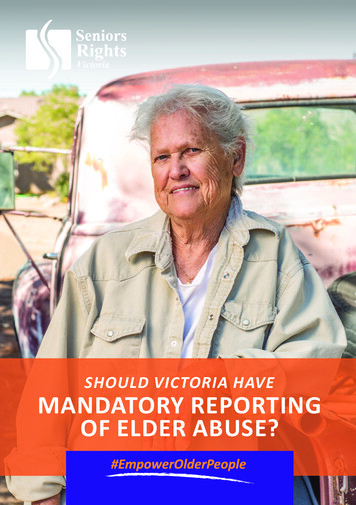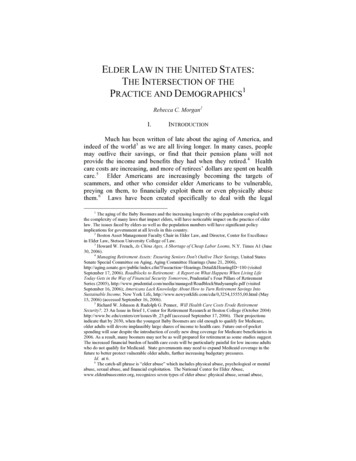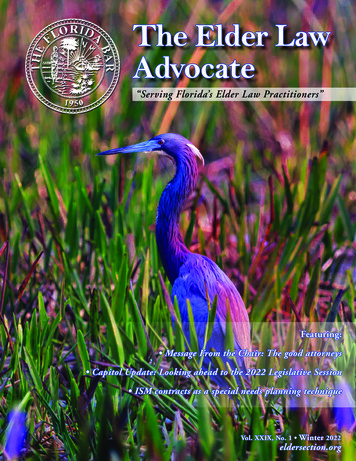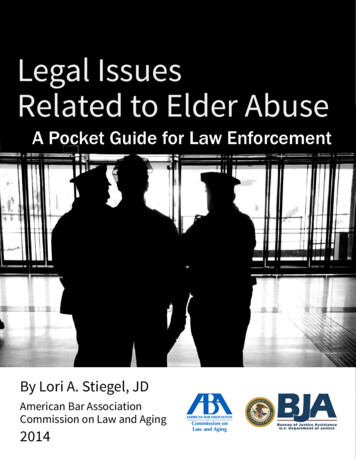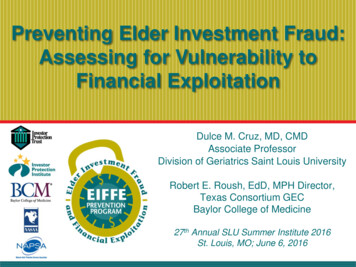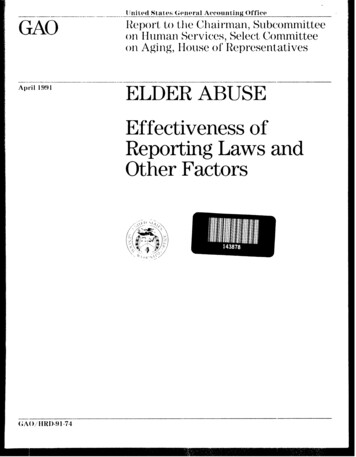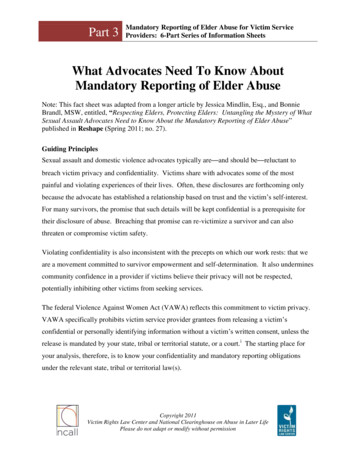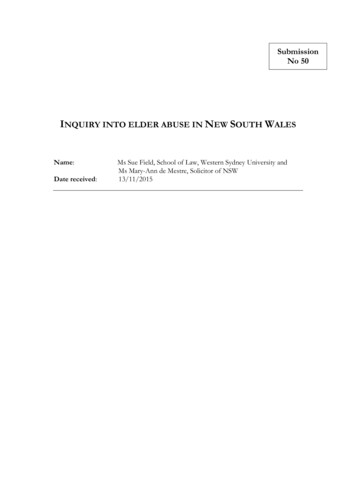
Transcription
SubmissionNo 50INQUIRY INTO ELDER ABUSE IN NEW SOUTH WALESName:Date received:Ms Sue Field, School of Law, Western Sydney University andMs Mary-Ann de Mestre, Solicitor of NSW13/11/2015
The DirectorGeneral Purpose Standing Committee No. 2Parliament HouseMacquarie StSydney NSW 2000Fax: (02) 9230 298113 November 2015Dear Ms Foley,RE: INQUIRY INTO ELDER ABUSE IN NSWWe welcome the opportunity to make a submission to this very important inquiry. We havechosen to restrict our submission to the subject of financial abuse and further narrow it downto financial abuse associated with the instruments known as Powers of Attorney.1. The prevalence of abuse (including but not limited to financial abuse, physical abuse,sexual abuse, psychological abuse and neglect) experienced by persons aged 50 years orolder in New South WalesThere are currently no reliable statistics on elder abuse as estimates vary considerably. Thereare many reasons given for this, not the least being that the abused individual may oftenconsider the reporting of abuse as shameful, particularly if the abuse has been perpetrated bya family member.Therefore, any information on elder abuse is usually anecdotal, or has been providedanonymously to organisations such as the Elder Abuse Helpline in NSW or the Elder AbusePrevention Unit (EAPU) which is based in Queensland.2. The most common forms of abuse experienced by older persons and the mostcommon relationships or settings in which abuse occursAs stated above, this submission will focus on one area, the financial abuse perpetrated byattorneys pursuant to a power of attorney instrument, in particular the enduring power ofattorney (which, remains in effect after the principal (the person appointing the attorney)loses mental capacity unlike the general power of attorney which ceases to have effect after aprincipal loses mental capacity.The potential for abuse of older persons derives primarily from four factors: the principal may be suffering from cognitive impairment, and thus will have minimalcapacity to effectively monitor the activities of his or her attorney;usually “highly trusted” family members and relatives are most commonly appointedas attorneys;there is generally a limited understanding of the powers and duties of the attorneyamong both the principals and the attorneys themselves; and1
the fact that a revocation of a power of attorney will only protect a principal’s assetsfrom future depletion by the attorney. Revocation does not address any loss theprincipal has already suffered and in order to recover any such loss, the principal isrequired to undertake recovery proceedings.3. The types of government and/or community support services sought by, or on behalfof, victims of elder abuse and the nature of service received from those agencies andorganisationsIn New South Wales the support systems available to victims of elder abuse are extremelylimited. The Aged Rights Service (TARS) remains the only pro bono community legalservice for older people in NSW and is essentially confined to the Sydney metropolitan area.The recently launched Government funded Elder Abuse Helpline is not a legal service andoffers limited information and resources to victims of elder abuse.4. The adequacy of the powers of the NSW Police Force to respond to allegations ofelder abuseAs this submission is confined to powers of attorney there is currently limited recourse to theNSW Police Force through legislation (specifically the Powers of Attorney Act 2003 (NSW)).Furthermore, if the abuse is perpetrated by a family member then it is unlikely that the victimwill report the matter to the police.The NSW Police Force currently do not have adequate powers to respond to allegations offinancial exploitation of principals, except if an allegation of fraud is brought by or on behalfof the principal (under s192E of the Crimes Act 1900 (NSW)).5. Identifying any constraints to elder abuse being reported and best practice strategiesto address such constraintsThe constraints to elder abuse being reported are three-fold:1. The Powers of Attorney Act 2003 (NSW) does not provide any sufficient recourse forcompensation or damages through the Guardianship Division of the New South WalesCivil and Administrative Tribunal (NCAT) or the Supreme Court of NSW where ithas been found that an attorney has abused their position for financial gain. UnlikeQueensland or Tasmania, where under the Powers of Attorney Act 1998 (QLD) s107and under the Powers of Attorney Act 2000 (Tas) s32 applications can be made forcompensation for loss of benefit in an estate;2. Secondly, many older people are not aware of the avenues that are currently availableto them, such as the making of an application (by a defined “interested person”) to theGuardianship Division of NCAT or the Supreme Court of NSW for a review of themaking, revocation or the operation and effect of the power of attorney under thePowers of Attorney Act 2003 (NSW) (specifically Part 5); and3. Thirdly, even if the older person is aware of the process of making such anapplication, they are unlikely to make an application themselves for a number ofreasons. These reasons include a lack of finances to run the litigation (in the SupremeCourt), a general reluctance to engage in “legal matters”, a fear of retribution from the2
perpetrator, or fear of losing the “support” and contact with the perpetrator (if theperpetrator is a family member) and also the potential loss of contact with theirgrandchildren.6. Identifying any strength based initiatives which empower older persons to betterprotect themselves from risks of abuse as they ageThe key to empowerment of older people is through education of older persons specifically inrelation to recognition of abusive situations, in the early stages, and the provision of resourcesto assist older people address it before it progresses to a “full-blown” situation creating anirreversible outcome and financial destitution.Examples of educational resources are the “How Could They” brochure series co-producedby the NSW Older Women’s Network and the University of Western Sydney (now WesternSydney University) and the “Respect for Seniors” series of DVD’s produced by the St. IvesUniting Church.Further examples include the Legal Aid of New South Wales brochures targeted at olderpeople such as “are you experiencing violence or abuse” and “speaking for myself: planningfor later life decision making”.7. The effectiveness of NSW laws, policies, services and strategies, including the 2014Interagency Policy Preventing and Responding to Abuse of Older People, in safeguardingolder persons from abuseCurrently in NSW the only available avenues to obtain a remedy for an exploited principalare as follows:1. Under statute: bringing a claim for fraud under the Crimes Act 1900 (NSW) orunconscionable dealing under the Contracts Review Act 1980 (NSW); and2. Equitable remedies: bringing a claim for breach of fiduciary duty1, unconscionableconduct or undue influence.2Reported decisions to date in respect of an abuse of a power of attorney include equitableremedies such as restitution for unjust enrichment3, declaration of invalidity4 and ordersunder the Contracts Review Act 1980 (NSW) for unconscionable dealing.5Despite the potential outcomes of redress, the pursuit of common law remedies in particularis often impracticable given the standard of proof required and the inherent cost of litigation.1Ward v Ward (No 2) [2011] NSWSC 1292; Catherine Margaret Thorn, as Executrix of the Estate of the LateBetty McAuley v Ian Geoffrey Boyd [2014] NSWSC 1159.2Janson v Janson [2007] NSWSC 1344.3Lake v Crawford [2010] NSWSC 232.4Szoda v Szoda [2010] NSWSC 804.5Spina v Conran Associates Pty Ltd [2008] NSWSC 326. Other cases involving the grant of a power of attorneyinclude but are not limited to: Klotz v Neubauer [2001] SASC 454, Watson v Watson [2002] NSWSC 919, P vNSW Trustee & Guardian [2015] NSWSC 579.3
It is argued that the Powers of Attorney Act 2003 (NSW) in its current form, allows forfinancial exploitation, in particular because of the following provisions:o Firstly, the option of an attorney to commence their powers “once my attorneyconsiders that I need assistance managing my affairs” (clause 4 of theEnduring Power of Attorney form);o Secondly, there is no sufficient checking mechanism on an attorney andtherefore unless a third party has a vested interest in the financial affairs of theprincipal (and subsequently makes an application to the Guardianship Divisionof NCAT or the Supreme Court of NSW) for a review of the power of attorney(under the Powers of Attorney Act 2003 (NSW)) it is likely to go unnoticed.Examples of a third party include a Residential Aged Care Provider, whoknows that the fees of the care recipient are the responsibility of the attorney(and the fees are no longer being paid), or a family member who can see theirinheritance dissipating before their eyes; or it may also be a concernedindividual who can see that the principal is being financially abused;o Thirdly, the only avenue of recourse available to an exploited principal is for areview of the power of attorney under the Powers of Attorney Act 2003 (NSW)(Part 5) and can only be made by an “interested person” being the attorney,principal, or other person who has a “proper interest” in the proceedings or a“genuine concern” for the welfare of the principal; ando Fourthly, although attorneys must keep separate financial records, there iscurrently no requirement in NSW to ensure the attorney furnish accounts ofthe principal to a third party (unlike appointed financial managers who mustpresent audited accounts annually to the NSW Trustee and Guardian).However, in Queensland under s85 of the Powers of Attorney Act 1998 (QLD)an attorney is required to keep and preserve accurate records and accounts ofall dealings and transactions made under the power and in South Australiaunder s8 of the Powers of Attorney and Agency Act 1984 (SA) it is an offenceto fail to keep and preserve accounts of dealings.8. The possible development of long-term systems and proactive measures to respond tothe increasing numbers of older persons, including consideration of cultural diversityamong older persons, so as to prevent abuseAmendments to the Powers of Attorney Act 2003 (NSW) are urgently required. There are anumber of possible long term systems and proactive measures that can be taken to preventelder abuse such as: Removal of the option referred to in 7. above (in respect of when the instrumentcomes into effect);Implementation of a checking mechanism, such as the presentation of auditedaccounts, perhaps to the NSW Trustee and Guardian;Requirement of compulsory education of attorneys prior to their appointment (sucheducation could be in the form of a short module on the powers and responsibilities ofan attorney);4
The Introduction of the following legislative inclusions into the Powers of AttorneyAct 2003 (NSW), similar to that which is inserted in the newly introduced Powers ofAttorney Act 2014 (VIC), ss 4, 5 and 21.o principles to determine capacity should also be inserted to guide theassessment of decision making capacity [where the principal’s capacity maybe in question];o a definition of “ decision making capacity”;o assessment of “decision making capacity”;o duties of enduring attorneys (or as outlined in s7 of the Powers of Attorneyand Agency Act 1984 (SA));The introduction of a presumption of undue influence where a transaction is enteredbetween the principal and either the attorney or a relative, business associate or closefriend of the attorney, similar to the Powers of Attorney Act 1998 (QLD) s87. Such atransaction would give rise to a presumption in the principal’s favour that theprincipal was induced to enter the transaction by the attorney’s undue influence.Education of the individual principal as to their rights against the attorney and theresponsibilities of an appointed attorney;Education of the witnesses of enduring powers of attorney, as research demonstratessome witnesses are not as familiar with the instruments as one would expect. It shouldbe noted, that Law Societies generally do have in place Guidelines for PractitionersPreparing and Witnessing Enduring Powers of Attorney.Expansion of the subject Elder Law into undergraduate law courses, as currently itwould appear that this is only taught at one university within Australia – WesternSydney University;Introduction of mandatory courses, for practitioners, on the assessment of mentalcapacity;Implementation of mandatory CPD for all prescribed witnesses (and those drafting theinstruments) of enduring powers of attorney such as is required for the witnesses whoare employed in Trustee companies, (s19(2), Powers of Attorney Act 2003 (NSW));Amendments to the Act which would permit the Guardianship Division of NCAT toprovide recourse where financial abuse has been found to occur; andProducing the powers of attorney forms and accompanying information brochure in anumber of community languages allowing for both English and a number of otherlanguages.9. The consideration of new proposals or initiatives which may enhance existingstrategies for safeguarding older persons who may be vulnerable to abuse, Further expansion of pro bono legal services throughout New South Wales, similar tothose provided by both the Queensland and Victorian Governments;Advertising, through appropriate media outlets which are educationally and culturallyspecific, at times that are appropriate to specific age demographic, such as 3am radio,and in particular community centres and local government publications etc;Coordinated information and education should be available to increase recognition ofpowers of attorney and to help recognize and detect abuse (through unusualsigns/behaviour) and reporting of financial abuse to a central body;Inclusion of a checklist to assess a principals’ understanding of the nature and effectof the power of attorney and guidelines as to how to identify and report evidence of5
duress, exploitation and any evidence that may put the principal’s capacity intoquestion;Creating criminal offences for the abuse of powers of attorney, whether by inclusionin the Crimes Act 1900 (NSW) or the Powers of Attorney Act 2003 (NSW), similar tos135 of the Powers of Attorney Act 2014 (VIC) whereby it is an offence to dishonestlyobtain/revoke or use an enduring power of attorney to either obtain a financialadvantage or to cause loss to the principle;A requirement for the enduring power of attorney to be registered before theinstrument takes effect;Implementation of a recognised procedure to revoke a power of attorney;In its current form a lay person can obtain a general power of attorney, complete theblanks in the form and appoint an attorney without the intervention of any advice as tothe full consequences of their action. All general powers of attorney should contain acertificate by an approved witness to the principal's signature as required for by anenduring power of attorney; andA further certificate should be required by an approved witness to the attorney'ssignature to the effect that the witness had explained to the attorney the fiduciarynature and consequences of breach of the office of attorney and that the attorney hadconfirmed to the witness the attorney's understanding of the advice received.10. Any other related matterSome financial abuse is not malevolent but occurs through a lack of understanding as to thefiduciary duties of the attorney. This may be in part due to cultural differences, whereby itmay be that the first born son automatically assumes the role of attorney, irrespective of theirfinancial acumen. It may be that parents believe that they are obliged to appoint their children(who may be “upset” if not appointed by their parent/s). Many older people themselvesconfuse powers of attorney, enduring guardianship, advance care directives and wills andtherefore are not in the position to have a full appreciation and/or understanding of theimplications of appointing or not appointing an attorney.We believe that there are four essential and non-negotiable criteria when appointing anattorney; The attorney must have integrity;They must have financial acumen;They must be fully informed of their responsibilities and the consequences ofnot adhering to these responsibilities; andThey must be available, that is both geographically and willing.Should a proposed attorney not meet all four criteria, it is argued that irrespective of theirstatus, they should not be considered appropriate to be appointed as an attorney. However,should these criteria be met then it is argued that some of the financial abuse experienced byvulnerable people would be minimised.Each state should actively promote and support national harmonisation of powers of attorneylegislation as recommended by the Victorian Law Reform Commission’s Inquiry into Powersof Attorney Report and in the earlier House of Representatives Report on Older People andthe Law.6
A national register for powers of attorney should be implemented. However, inrecommending this we are mindful that the issues of privacy, cost and the need for eachinstrument to be validated at the time of registration, must also be taken into consideration.Yours sincerely,Sue FieldAdjunct Fellow in Elder LawSchool of LawWestern Sydney UniversityMary-Ann de MestreSolicitor of NSW7
ReferencesEllison, S, Schetzer, L, Mullins, Perry, J & Wong, K 2004, The legal needs of older people inNSW, Law and Justice Foundation of NSW, SydneyHouse of Representatives Standing Committee on Legal and Constitutional Affairs,Parliament of Australia, Older people and the law, 20 September 2007New South Wales Government, Attorney General’s Department, Capacity Toolkit, (June2008) Lawlink cuments/capacity toolkit0609.pdf Older Women’s Network NSW, How Could They (2010) http://www.ownnsw.org.au/howcould-they/ St Ives Uniting Church, Respect for Seniors http://www.respectforseniors.org/?p dvd Law Reform Committee, Parliament of Victoria, Inquiry into powers of attorney (2010)University of Western Sydney, Cognitive Decline Partnership Centre and COTA (NSW) ThePolicies and Practices of Financial Institutions around Substitute Decision MakingInstruments, December, 2014Legal Aid of New South Wales, series of brochures in relation to older persons, eets-and-resources Crimes Act 1900 (NSW)Powers of Attorney Act 2003 (NSW)Powers of Attorney Act 2014 (VIC)Powers of Attorney Act 1998 (QLD)Powers of Attorney and Agency Act 1984 (SA)Powers of Attorney Act 2000 (TAS)8
Catherine Margaret Thorn, as Executrix of the Estate of the Late Betty McAuley v Ian Geoffrey Boyd [2014] NSWSC 1159. 2 Janson v Janson [2007] NSWSC 1344. 3 Lake v Crawford [2010] NSWSC 232. 4 Szoda v Szoda [2010] NSWSC 804. 5 Spina v Conran Associates Pty Ltd [2008] NSWSC 326. Other cases involving the grant of a power of attorney
